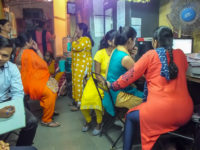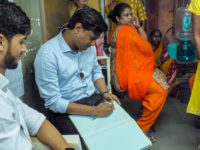AN INTERN'S VISIT TO AASTHA PARIVAAR UNIT 2
On the 5th of February, 2019, I, along with three other interns, had the privilege of visiting Aastha Parivaar Unit 2 to learn about the work they do in their community and the issues they face. I am a student from University of Auckland (New Zealand) completing a 6 week internship with Aastha Parivaar, developing their communications and updating their website. The other three interns, Ravi, Amar and Pranay, are from Mumbai’s NMIMS College and are completing a 20 day internship as part of their MBA.
In a fluorescently lit room down a darkened alleway sit a team of 6 women fighting one of the most stigmatised battles in Indian culture: HIV prevention and sex worker advocacy and empowerment.
The women are passionate and articulate, and the Hindi is flowing too swiftly for my translator to keep pace. These women are members of one of the 13 Community Based Organisations (CBOs) throughout Mumbai, Thane and Pune under the umbrella NGO Aastha Parivaar. Aastha Parivaar is a federation of sex workers, headed by a secretariat, that works to empower sex workers, referred to as the key population (KP), to independently manage their affairs. Their main areas of focus are: HIV intervention, health care, crisis intervention, legal literacy, alternative livelihoods and education for children of the KP. Each CBO independently funds and supports their KP to meet the goals of the organisation. It’s not an easy job, and the past year has been especially taxing.
This particular CBO, Aastha Parivaar Unit 2 along with its associate targeted intervention centre (TI), Aasha Darpan, is finding it increasingly difficult to provide the necessary support to their community. A large issue they are facing is space. The office we are sitting in is barely 3 meters wide, 5 meters long and in parts, only 170cm high, and is the only facility they have. This means that they are unable to care for HIV positive KP members, conduct testing onsite or facilitate regular alternative livelihood courses.

T.I. staff at work in their tiny basement office
The decreased capacity of the CBO to provide accessible testing and further support to the KP in their community makes it increasingly difficult to incentivise the KP to get regular tests and check ups. The majority of the brothel-based sex workers work through the night, and therefore usually sleep throughout the day. The local hospital offers testing and HIV checkups from 9am-12pm, which is usually the KP’s only opportunity to get some much needed rest.
In order to get the sex workers to these sessions, Aastha Parivaar Peer Navigators (PN) must bang on the doors of their rooms in the brothel to drag them along. Adding difficulty to this, the sex workers are often misinformed or are in denial about the risks of HIV, and often oppose to regular visits from the PNs. HIV positive brothel-based KPs do not want to risk clients or their roommates learning about their condition for fear of being turfed out, and as a result sever contact to the CBO’s TI.
Once an individual has tested positive for HIV, it is possible to lead a full and healthy life if antiretroviral therapy (ART) is started quickly and maintained consistently. ART stops the progress of HIV, and prevents it from developing into AIDs. Additionally, ART enables the individual to reach an undetectable viral load, meaning they are at no risk of passing on the disease sexually. Unfortunately, aside from the inconvenience of receiving the treatment, many of the KP are put off by the side effects of the medication which can include dizziness and marks on the skin. However, the consequences of refusing to accept regular HIV screening and testing are dramatic for both the individual and the CBO.
In one recent case a sex worker, who had been a regular attendee of TI events and check ups, was confirmed HIV positive roughly four years ago. She denied her status and cut all communication with the TI, despite repeated efforts to convince her to begin treatment. By 2018, she had lost the ability to walk and her pimp turfed her out of the brothel and sent her back to her hometown. Less than a week later, her son dumped her at a street near the brothel, where, unable to walk, she crawled back to the brothel door. The brothel owner refused to take her in as it could harm business, and called on TI staff to intervene.
She was admitted to a rehabilitation centre and placed on ART, but within a week was once again kicked out as she was completely bedridden, which is against the centre’s policy. She was then admitted to Nair Hospital under the condition that round-the-clock care was provided. Aasha Darpan staff crowdfunded from other sex workers and used the limited CBO funds to pay for two nurses to shower, toilet and feed her 24 hours a day, as well as for food, medicine and other needs in hospital. Despite their best efforts, the woman passed away on the 1st of February, 2019, without any financial or emotional support from her pimp or brothel managers.
All up, this ordeal lasted 45 days and cost AP Unit 2 and Aasha Darpan around 90 000 rs., on top of the many hours of time spent at the hospital with the patient. Although there are around 16-17 cases per year of KPs dying due to refusing ART treatment, the process is usually over within a few days. AP Unit 2 does not have the space, nor the resources to provide such long-term care independently, as their small budgets are typically reserved for ART treatment and cremations of HIV sufferers whose family refuse to perform funeral ceremonies. They would like to see the implementation of care homes dedicated to looking after HIV patients in the late stage of the illness. Their argument is that as care homes are readily provided for children and the elderly, the only feasible reason for the lack of an HIV-specific facility is stigma.

NMIMS interns, Pranay and Amar, writing their observations
The issue of space shackles the AP Unit 2 in other ways as well. As part of their HIV prevention initiative, they hold condom drives on a monthly basis, where sex workers may come down from the brothel and collect their allotted number of condoms (150 to be precise). This should ideally be an opportunity to connect with the workers, hear how they are doing and create a sense of community, however the tiny room is so packed that the women collect their packages and leave.
Additionally, this lack of space prevents AP Unit 2 from hosting significant alternative livelihood courses. Aastha Parivaar aims to offer courses on alternative ways for sex workers to generate income, including mehndi, beauty therapy and chocolate making courses. The CBO lacks adequate funds and facilities to offer these courses to large numbers, resulting in only 1-2 sex workers per year having the opportunity to switch profession.
The lack of capacity overall appears to cause alternative livelihoods to fall back in terms of the organisation’s focus. One of the sex workers I spoke to said she would happily switch profession if one could be found which would roughly match her current monthly income of around 15 thousand rupees. The issue, however, is that she lacks the resources and ability to hunt for alternative professions herself, and wishes Aastha Parivaar could help her in finding a post as an in-house maid, for which she requires no extra training.
In general, a common criticism from the KP of Aastha Parivaar is that there appears to be little overarching long term focus, with too greater emphasis placed on a project to project basis. One example of this is that all KPs were provided with Horlicks and other small items when they came to receive their medicine, however this was stopped once the project was over. The transition back to simply receiving their medication was not taken well by the KP, with many finding it demotivating.
So where to from here? The way forward is complicated. AP Unit 2 could find another location out of which to operate, however the KPs are now accustomed to the office being located conveniently beneath the brothel, sparking fears that moving elsewhere could cause a drop off in regular attendees. Similarly, the rent prices in the suburb close to the brothel are incredibly high, making it difficult to find a larger location nearby. There is no government funding to aid in such activities, so the CBO must find its own way of raising money to serve their community, which they primarily do through purchasing condoms in bulk and reselling them for a small margin. Similarly, funding does not exist in endless streams, therefore it is an unfortunate reality for many NGOs that the nice additions they are able to offer to their beneficiaries may come to an end at any time.
Long term, AP Unit 2 and Aasha Darpan could work towards petitioning for HIV shelter homes and gaining the CBOs greater facilities to better enable them to empower and serve a connected, healthy and informed community. As a short term solution, an agreement could be struck with a large community centre in the neighbourhood to utilise the facilities once to twice per month to host health camps, education sessions and alternative livelihood courses.
Overall Aastha Parivaar and Aasha Darpan are respected within the community, with the two sex workers I spoke to highly praising the support they receive from the organisation. There is no doubt that the work they do is essential to the community it serves, however focus must be turned to ways in which their reach can improve and expand.
– Elise, University of Auckland. Currently completing a 6 week internship with Aastha Parivaar thanks to the Prime Minister’s Scholarship for Asia and AIC.
